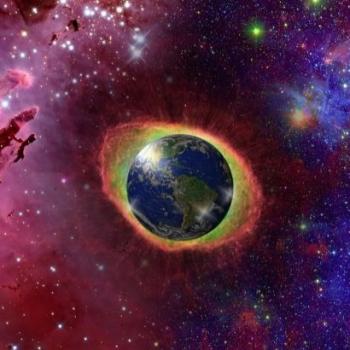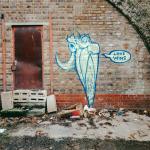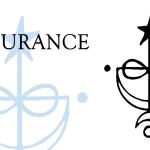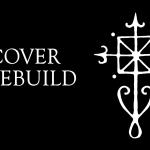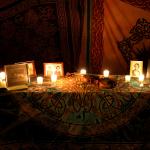I apologize to my loyal and very much appreciated readship that I have not posted anything for quite a few days. Life has been difficult. Perhaps I’ll write more about that.
In the meantime, I am posting here, after much thought, what is perhaps the most significant poem I have ever written. Please notice that the first stanza is spoken by Alta, my second wife, whom I would never have left if I had not become manic. It begins as a dirge for the child we lost, who would have been my first child, then morphs into a meditation on the nature of our minds.
I
“As I stood on the cliff above the sea
While you were practicing the Mysteries,
The wind came to me and said, `I want.’
What, can’t be told in words, but I knew
It wanted one of us and would not leave
Without our passion, or a life.
I sacrificed what I had to, to the wind.
I felt the child’s soul leave, and was alone.”
Ah, beloved, how did we survive those days
Of our madness? I am ashamed now,
Knowing how near I came to losing you as well.
So I must believe, despite my unbelief,
That somehow we were guided and protected,
That our all-too-human madness was, in part, divine.
How do I mourn my child who could not be?
Let me confess: I feared my fatherhood,
Feared to be Joseph, or to father a Mozart,
And failed to prepare my soul’s womb for you,
Whom I’d have loved so deeply, anyway.
I fear it was my fear that was the wind.
O child, if nothing’s lost from the only mind,
Then choose a better sire next time.
If nothing can be lost, then it’s always here
And always now—but my guts are scored
By randomness. I cannot tell what else might be
From this black-and-white photography.
I wish I could just turn, pure and careless,
To numbers. Oh, riddle me, riddle me,
The plot of this reality!
II
Maybe the old magicians knew
More than they said, weren’t so much down
On sex as knew it for a cuckoo
That can push every other purpose from the will.
“The intellect of Man must choose
Chasing women or chasing the Muse.”
Is this true? Does the merely real
Spoil the soul’s hunger for the ideal
But never final symphony?
Argonauts must sail between the clashing rocks
In no time at all—for any time is hesitation,
And they’re lost. If we could always live
Right now, in the infinite sandgrain,
In the redeeming flower, we’d know
That eternity is always now, and not
Unending time. But remembering a second ago,
We live by instant replay, and are lost:
The angel with the sword that turns
In the infinitesimal difference between then
And now drives us from the gates of paradise.
Yet we can be saved, and by this paradox:
Sex, or anything that nails us to the instant
Quick, can leap us through the needle’s eye.
III
Paradox deflates the conscious mind,
And when at last it’s flat, the face
You see inside’s no alien god:
It’s all of us, but all at once.
And perhaps this is the only god we know:
Here Comes Everybody, in collective mind,
I.Q. four trillion, purposes unknown,
Yet not itself unknowable, but immanent,
Here, now, in the twinkling of the needle’s eye—
If only my eye could see itself.
O does some great Being peer through me
As I peer through my eyes?
Am I not really me, but everyone?
Is my will never free unless I let it go?
Either prove this wrong or take it
For a good. Some such must be true, but how
Do I get a grip on this angel
To wrestle him for wisdom?
Can I again survive that face
In every sandgrain, every flower?
Ah, but I cannot fear that lovesong I was
In the embers of that gracious leak,
And now I can remember how to praise,
Praise and celebrate the gyroscopic grace
That is always given, if we only knew.
If my inner sea’s alive,
If it’s a mind of all mankind
Spread by inexplicable waves
Into a cosmic consciousness
That joins all galaxies in song,
It must still be the source I trust
Of all my certainty that we are good
In which I fell at age fourteen—and thus
I know that Mind is Love, and values me:
I’m me because it wants me so.
When I fall into it, it gives me joy
And gives me back myself, for which
It has a need, as do we all. And thus
The babe comes trailing clouds of glory, yes,
Already filled with all that makes a soul,
Reborn, for all things really are the same,
And utterly new, for every thing
Really is unique, and with some work
Of its very own to do. And thus
Through every baby’s eyes,
God first sees the world, surprised.
IV
On this hypothesis I could take
All Bibles and all faiths, and make
A whole of them—but no, that’s not my job.
There’s more I haven’t fathomed, and I know
I’m here in order to do something new,
Though what it is I’ve yet to find.
Besides, if all this jazz is true,
I’m not supposed to know—or that I do
Just means that I can take it and survive—
Since crazy St. Alan Watts revealed
That God and Satan have a deal
Not to cop out that their cosmic duel
Is a play designed to scare mankind
Into our schizophrenic mind,
Simply because a joke’s no fun
If there’s only yourself to play it on,
And that God loves Christians especially
Because they take the play so seriously.
Then might it be better not to tell,
Not to teach the child to doubt,
Lest the Sun and Moon go out?
No, that’s not the way it works.
I’m to tell everything I can,
And those who shouldn’t understand
Won’t get it anyway; so there’s no harm.
The hierophant and Juggler both
Represent the other mind:
The former tells, the latter shows,
Not all, but more than you can use,
And neither lies, though it’s up to you
To read between the lines. Mankind
Needs myths, to be our guides when, absorbed
In animal survival, as we’re supposed to be,
We’d stray into tarpits otherwise.
And to a crazy mind like mine,
The myths tell more, enough
To reconcile me to my unknown role:
I must be doing what I’m built for,
Though I may never know it,
And the plaudits of mankind, fame
And riches, honor, power, dung and dust, are all
Irrelevant, as all the prophets say.
We’ll never know what’s really happening,
And yet we’ve known it all along:
O we are a schizophrenic people:
So the gates of Hell cannot prevail
Against us. I suppose we must seem odd
To starry races elsewhere who are whole,
But I don’t want to be an ant or bee,
And our strange compromise has this to say for it:
It lets me be both me and God . . .
That’s quite a trick, I guess.
All right, I’ll persevere (no blame)
And hope for news—but look for it as well.
That’s still the same, because there is no way
To learn anything you’re not ready for:
Truth is either tautology
Or paradox; the difference is just
Whether you get the joke or not.






